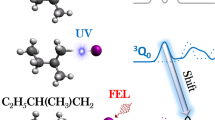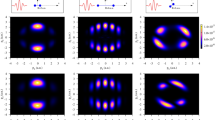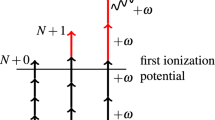Abstract
ABOUT two years ago I noticed1 that the positive ions generated along the path of an electron beam nearly all came out of the electron beam at right angles to it with energies of the order of 1 or 2 volts, that is, considerably higher than their thermal energies. I found that this was due to a radial potential gradient being set up around the electron beam by concentration gradients in the electron gas surrounding the beam. The presence of these radial potential gradients would introduce considerable difficulties into the accurate measurement of the kinetic energies of the dissociation products formed by electron impact in a molecular gas, for the dissociation products possess energies of only the same order of magnitude as the energy gained in falling through the potential gradient set up by the electron beam.
This is a preview of subscription content, access via your institution
Access options
Subscribe to this journal
Receive 51 print issues and online access
$199.00 per year
only $3.90 per issue
Buy this article
- Purchase on Springer Link
- Instant access to full article PDF
Prices may be subject to local taxes which are calculated during checkout
Similar content being viewed by others
References
Proc. Roy. Soc., 129, 361; 1930
Phys. Rev., 39, 254; Jan. 15, 1932.
Author information
Authors and Affiliations
Rights and permissions
About this article
Cite this article
ARNOT, F. Molecular Dissociation by Electron Impact. Nature 129, 617–618 (1932). https://doi.org/10.1038/129617b0
Issue Date:
DOI: https://doi.org/10.1038/129617b0
This article is cited by
-
Fatuoids or False Wild Oats
Nature (1932)
Comments
By submitting a comment you agree to abide by our Terms and Community Guidelines. If you find something abusive or that does not comply with our terms or guidelines please flag it as inappropriate.



